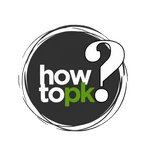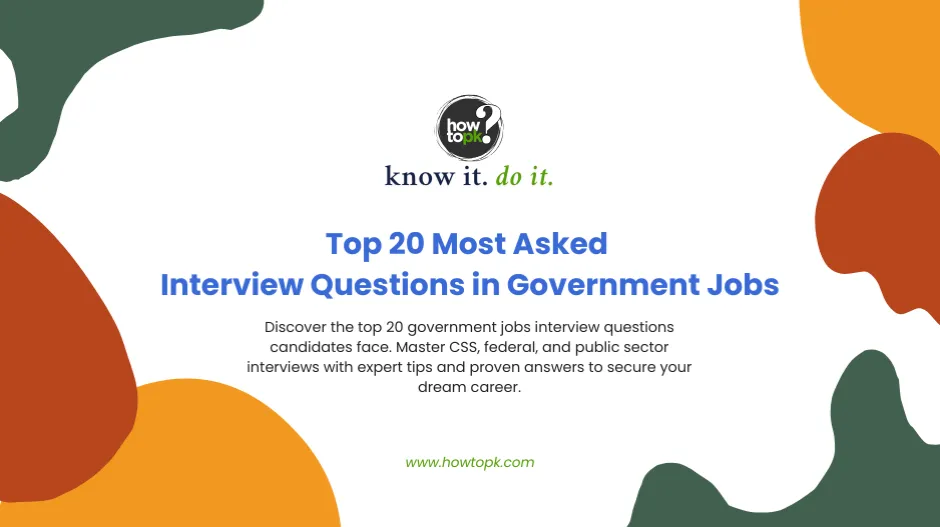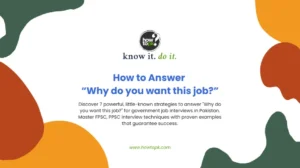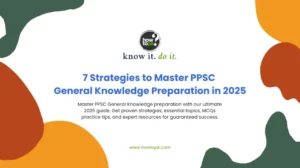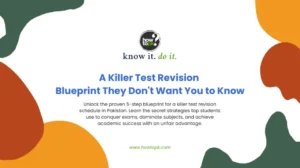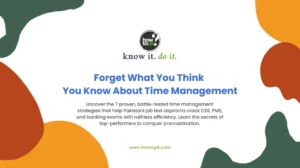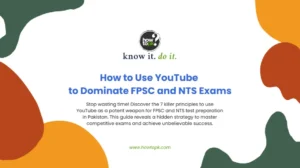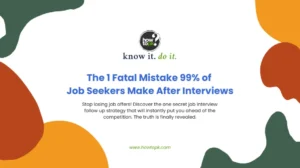You’ve battled through the written tests, a grueling gauntlet of knowledge and endurance. You’ve overcome thousands of competitors. Now, only one final, terrifying obstacle stands between you and a career of stability, power, and purpose: the interview.
But what if you knew their secret? What if you had an unfair advantage, a roadmap to the minds of the senior officials on the interview panel? This isn’t just a list of common questions; it’s a strategic weapon designed to transform you from a nervous candidate into an unstoppable force. The questions they ask aren’t random. They are carefully engineered to test your integrity, your knowledge, and your very soul.
Are you ready to discover the top 20 government jobs interview questions most elite recruiters use to separate the leaders from the followers?
This is your crucial moment. Here is the complete, uncompromising guide to mastering every question and revealing your true potential.
The Unspoken Truth About Pakistani Government Interviews
Forget what you think you know. Public sector interviews in Pakistan are not just about academic knowledge. They are a rigorous assessment of your character. The panel wants to know: Can you be trusted? Do you truly believe in public service, or are you just here for the pension? Do you have the spine to stand against corruption and the intellect to solve the nation’s most complex problems? Your every answer is a testament to your values.
The top 20 questions that follow are the keys to unlocking their trust.
1. The Core Purpose Question: Why do you want to work in the government sector?
This is the ultimate test of your sincerity. A weak answer about job security is a death sentence.
The Power Move: Don’t just say you want to serve. Show it. Talk about a specific, real-world issue in Pakistan—be it a struggling public school or a local infrastructure project—and explain how you are driven to be a part of its solution. Prove you are a visionary, not just an applicant.
2. The Research Challenge: What do you know about our department/ministry?
This question weeds out the lazy. Failing it signals a fatal lack of interest.
The Power Move: Go beyond the website’s “About Us” page. Mention a recent, specific project, a public statement by a key official, or a new policy initiative. For example, “I read about your ministry’s push for digital literacy in rural areas and I was fascinated by the potential to bridge the urban-rural divide.” This shows you’ve done the work.
3. The Integrity Crucible: How would you handle corruption if you encountered it?
This is a high-stakes question. A wrong answer could end your career before it even starts.
The Power Move: Be direct and uncompromising. State your absolute zero-tolerance policy. Then, detail the exact steps you would take: document everything, follow the official reporting channels, and refuse to participate, no matter the pressure. Frame yourself as a fearless guardian of public trust.
4. The Economic Reality Check: Describe Pakistan’s current economic challenges.
They are testing your awareness of the harsh realities facing the nation.
The Power Move: Speak with authority and provide concrete numbers. Mention the crushing reality of inflation, the monumental challenge of the external debt crisis, or the dire need to increase exports. Show you are informed, not just repeating headlines.
5. The Geopolitical Test: What are your views on Pakistan’s foreign policy?
A public servant must understand Pakistan’s place in the world.
The Power Move: Show a balanced, nuanced perspective. Discuss relationships with China and the strategic importance of CPEC, but also acknowledge the complex and volatile dynamics with India and Afghanistan. Your answer must demonstrate a strategic mind.
6. The Innovation Gauntlet: How would you improve government service delivery?
They want to see if you can think like a problem-solver, not a bureaucrat.
The Power Move: Propose a tangible solution. Suggest a simple e-governance app, a public feedback mechanism, or a targeted training program for frontline staff. Your idea must be practical and impactful.
7. The Behavioral Deep Dive: Describe a difficult situation you’ve handled and how you resolved it.
This is not a trick question; it’s a test of your resilience and problem-solving.
The Power Move: Use the STAR (Situation, Task, Action, Result) method. Describe a genuine challenge, what you were tasked with, the specific actions you took, and the positive outcome you achieved. The focus is on your actions, not the problem itself.
8. The Ideological Litmus Test: What do you understand by good governance?
This is a fundamental concept for any public servant.
The Power Move: Define it using key principles: transparency, accountability, and the rule of law. Show that you understand these are not just buzzwords but the foundational pillars of a functioning state.
9. The Political Minefield: How would you handle pressure from political figures?
This is the ultimate test of your professional courage.
The Power Move: Emphasize your absolute commitment to the law and the constitution. State that while you will act with respect, your decisions will always be based on the rules and your mandate—not on political influence.
10. The Modernization Challenge: What role should technology play in government operations?
They are looking for a candidate who is ready for the 21st century.
The Power Move: Talk about real, impactful applications. Mention using data analytics to inform policy, implementing online portals for citizen services, or enhancing cybersecurity to protect public data.
The Inner Sanctum: Advanced & Strategic Questions Revealed
These are the final, decisive questions that separate the great from the good. The panel is looking for leaders, not just employees. Mastering these questions will prove you have the vision to lead.
11. The Leadership Test: How would you motivate a demotivated team?
This question probes your ability to inspire. A bureaucratic answer is a failure.
The Power Move: Don’t just list strategies. Tell a story. Talk about a time you took the initiative to understand a team’s struggles, then implemented a solution like creating a new professional development path or celebrating small wins. Show, don’t just tell, that you are a true leader.
12. The Financial Strategy Question: Explain the concept of public-private partnerships (PPPs).
They want to know if you understand modern, innovative solutions to Pakistan’s development challenges.
The Power Move: Go beyond a textbook definition. Talk about the why. Explain how PPPs can mobilize private capital for essential infrastructure projects like roads, power plants, or hospitals, thereby sharing risk and accelerating development. Mention a real-life example of a successful PPP in Pakistan to demonstrate your knowledge.
13. The Information-Gathering Test: How do you stay updated with current affairs?
This is a question about your personal discipline and commitment to lifelong learning.
The Power Move: List specific, credible sources. Mention reputable newspapers like Dawn or The News, but also go further. Talk about following official government publications, think tank reports, and even professional journals. This shows you’re not just a passive consumer of news but an active, serious student of your field.
14. The National Vision Test: What is your understanding of Pakistan’s Vision 2025?
This question determines if you’re aligned with the country’s long-term strategic goals.
The Power Move: Name the key pillars of the vision—such as sustained and inclusive growth, democratic governance, and a knowledge economy. Then, connect your personal skills and ambitions to one or two of these pillars. For example, “My background in X can directly contribute to the ‘Knowledge Economy’ pillar by helping to integrate new technologies.”
15. The Accountability Check: How would you ensure transparency in your work?
This is a crucial question for building public trust.
The Power Move: Offer a specific, actionable plan. Talk about implementing clear public reporting on project progress, maintaining open communication channels with stakeholders, or even using a digital ledger to document all decisions. Your answer should leave no doubt that you will be a beacon of transparency.
16. The Constitutional Test: Describe Pakistan’s federal structure and provincial autonomy.
They are testing your foundational knowledge of the nation’s governance.
The Power Move: Demonstrate a clear understanding of the division of powers between the federal and provincial governments, especially after the 18th Amendment. Mention the abolition of the concurrent legislative list and the increased financial autonomy for provinces. This proves you are well-versed in the country’s legal and political framework.
17. The Collaboration Challenge: How would you handle inter-departmental coordination challenges?
Government work is often about teamwork. They are testing your diplomatic and problem-solving skills.
The Power Move: Suggest practical solutions. Talk about establishing formal communication protocols, creating shared objectives to unify different departments, and using data to resolve conflicts and build consensus. Show that you are a team player who can navigate complex relationships.
18. The Global Responsibility Test: What are your thoughts on Pakistan’s climate change challenges?
This question shows if you understand the monumental environmental threats facing the country.
The Power Move: Be specific. Talk about the tangible impacts like devastating floods, water scarcity, and the impact on agriculture. Discuss potential solutions such as investing in renewable energy, promoting water conservation, or implementing climate-resilient infrastructure.
19. The Sustainable Vision Test: How would you contribute to Pakistan’s sustainable development goals?
This question assesses your awareness of the global and national development agenda.
The Power Move: Link your specific professional skills to one or more of the SDGs. For example, if you are a project manager, talk about how your skills can help implement projects that contribute to SDG 9 (Industry, Innovation, and Infrastructure). If you’re a policy analyst, discuss how you can help craft policies that reduce poverty (SDG 1).
20. The Long-Term Commitment Question: Where do you see yourself in five years within government service?
This is your chance to show your ambition and long-term dedication to public service.
The Power Move: Don’t just say you want to be promoted. Talk about a specific role you aspire to and, more importantly, what you will have to do to get there. Mention skills you will acquire, professional development opportunities you will seek, and how you will have contributed to the department’s mission in a meaningful way.
Your Final, Crucial Step
Don’t just read these questions. Master them. Practice your answers, rehearse them, and refine them until they sound not just correct, but authentic. The interview is not an interrogation; it’s a conversation where you reveal yourself as the leader Pakistan desperately needs.
The next time you face a panel of seasoned interviewers and they fire off those crucial government jobs interview questions top candidates fear most, you will be prepared. You will be confident. You will be unstoppable. The future of Pakistan is waiting.
